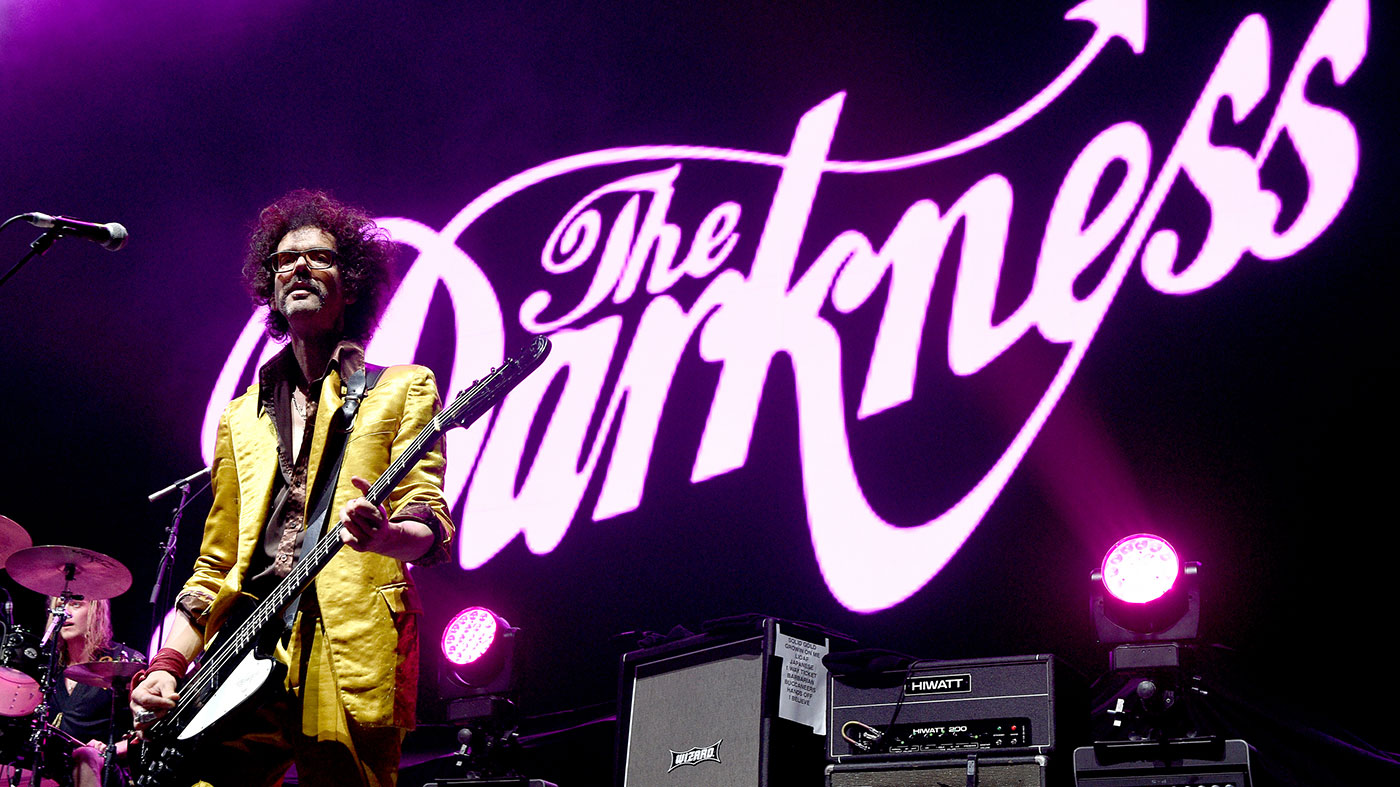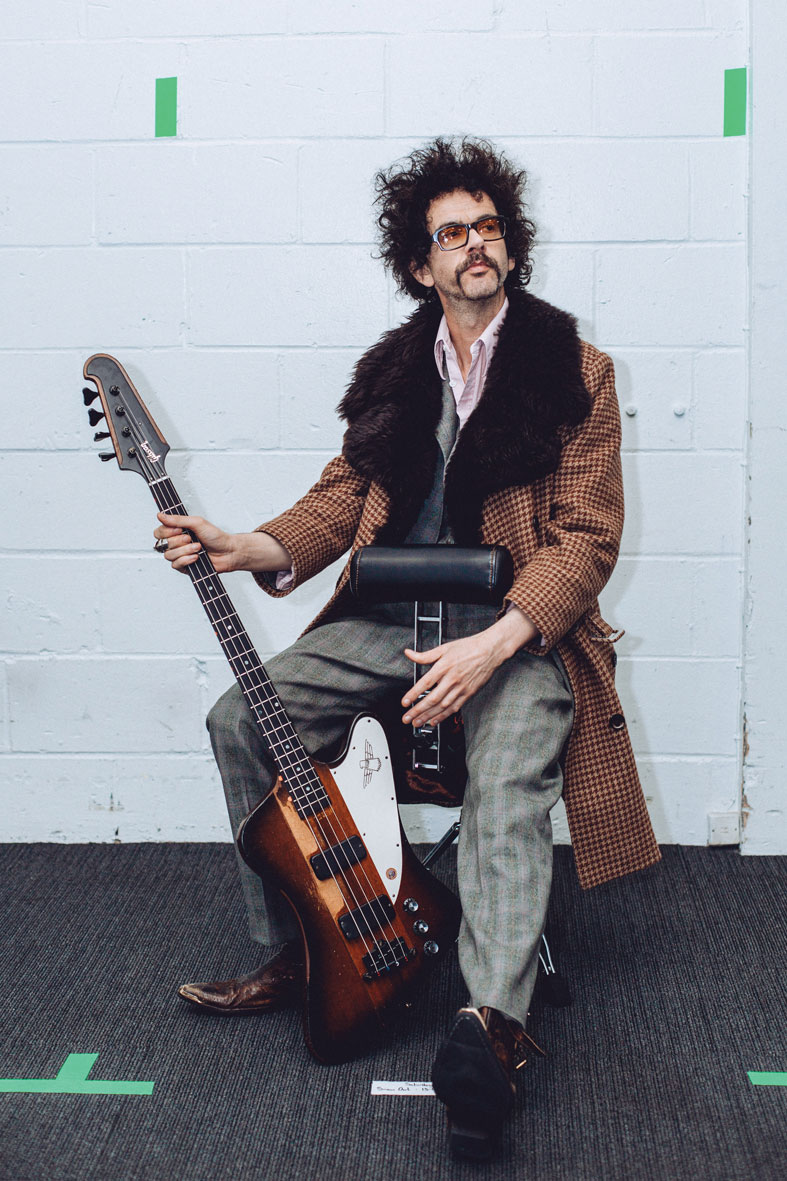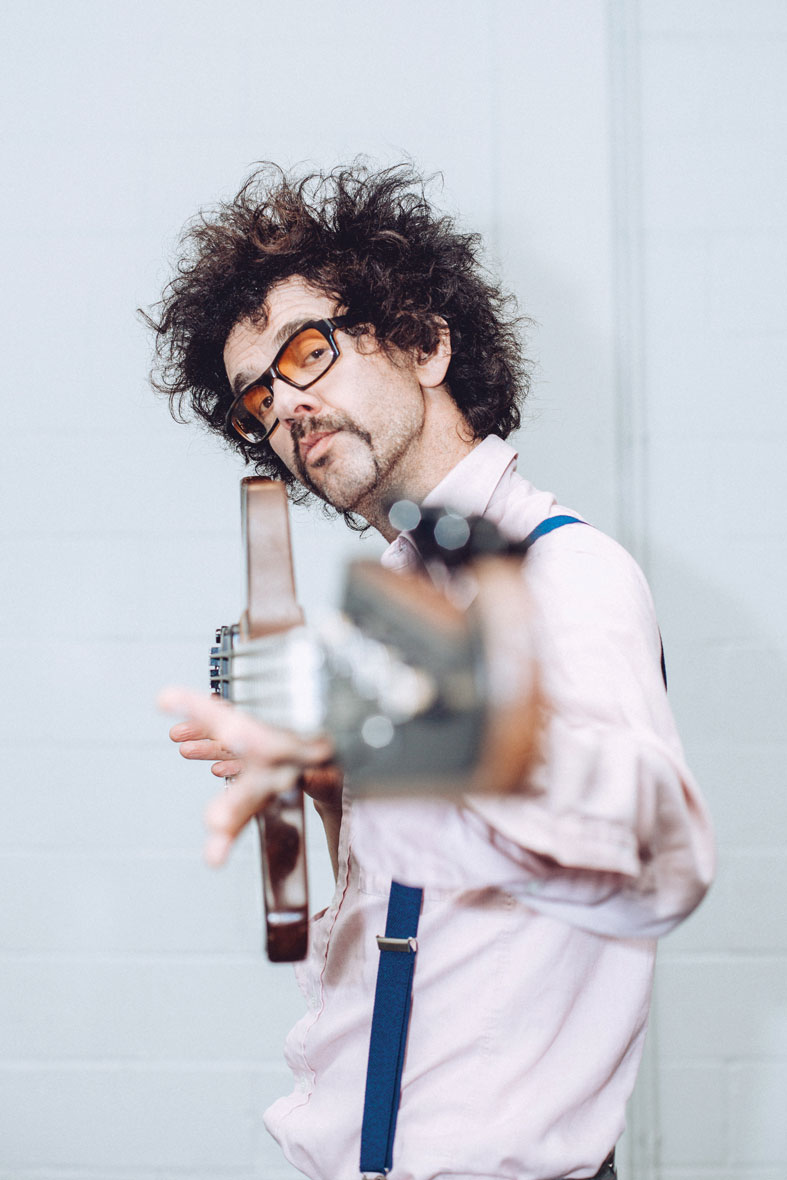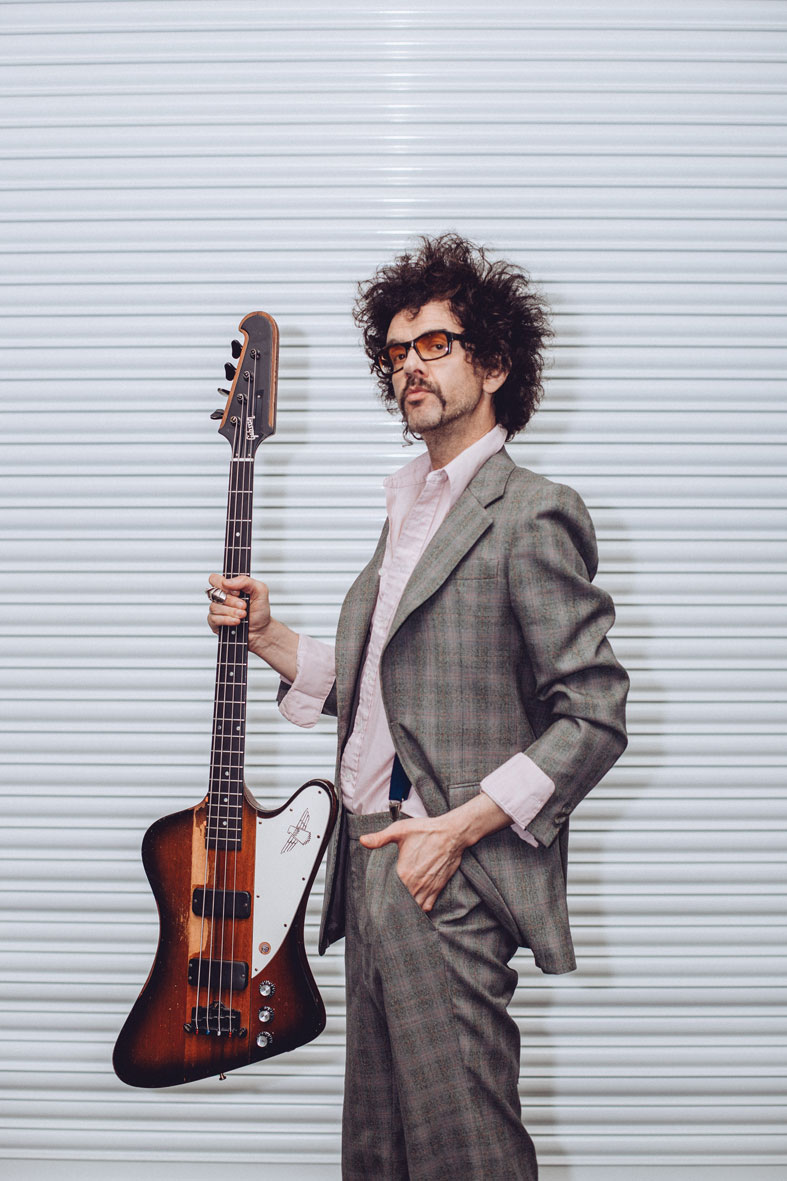The Darkness's Frankie Poullain: “I honestly believe irreverence is the key to great rock music… and we just didn’t care”
The bassist on his past, present and beloved Thunderbird bass

Want all the hottest music and gear news, reviews, deals, features and more, direct to your inbox? Sign up here.
You are now subscribed
Your newsletter sign-up was successful
Backstage at this year’s London Bass Guitar Show, The Darkness’ Frankie Poullain is soaking up the noise. As you’d imagine, there’s plenty of it - loudest of all Colombian six-string virtuoso Snow Owl, showcasing his terrifying fusion chops over on the Main Stage.
“Nobody’s expecting me to play, are they?” chuckles Poullain, as his tech brings over the instrument which took him from residencies in Camden pubs to headlining the Reading Festival in a whirlwind 18 months. Affectionately named ‘The Brown Bastard’, this 1991 Gibson Thunderbird IV has been seen in all of the Lowestoft quartet’s early videos and sits on his side of the stage for every tour to date.
I always liked the way Thunderbirds fell over, ha ha! I knew it would annoy people when they tried leaning it against things
After catching up with Thunder’s Chris Childs, who himself performed at the event earlier in the morning, and posing for some photographs, this month’s cover star brings over a bottle of wine and two glasses to relive one of British rock history’s most rollercoaster rides, starting with the bass in his hands…
“I bought this Gibson in the first year of The Darkness,” says Poullain, his Scottish accent ever so slightly lulled by the endless months of touring the world and living around Europe.
“I always liked the way Thunderbirds fell over, ha ha! I knew it would annoy people when they tried leaning it against things. Ray Williams, a lovely guy and bassist in [Welsh indie rockers] The Pooh Sticks, happened to be selling it, and to be honest, I didn’t love it straightaway, I grew into it. It had Kent Armstrong pickups but eventually I had the guitar restored to its original ones. In the band we started out as, Empire, I was using a black Music Man and felt like such a fraud… it was so 90s. I went the opposite direction!”
Try to picture any other instrument in the bassist’s hands during The Darkness’ notoriously energetic live performances, and you’ll be inclined to agree it was definitely the right decision. That “first year of The Darkness” he speaks of was remarkable for many reasons. Once guitarist Dan Hawkins’ older brother Justin had joined, originally on keyboards, they gradually mutated into something bigger and better. The shift in dynamic with their newest member now fronting the band, while also doubling up on guitar duties with his sibling, was clear as day.
“The good thing was that Justin felt confident enough to be silly,” explains the four-stringer. “He became the joker guy and would make gags during the gigs, just taking the piss out of other bands or making risqué jokes. I honestly believe irreverence is the key to great rock music… and we just didn’t care.
Want all the hottest music and gear news, reviews, deals, features and more, direct to your inbox? Sign up here.
“Think about it, all the best bands came from not caring. Looking back over generations - you’d have the people that were more into either the Pistols or the Clash, Nirvana or Pearl Jam, Adidas or Nike. To me, the playfulness and inspiration came from the first three - the Pistols, Nirvana and Adidas - because they had to circumnavigate their own self-consciousness instead of following someone else’s. The others are the try-hards. The ones that came afterwards and maybe took it a bit too seriously.”

Permission To Land
As light-hearted as the 10 tracks penned for their Permission To Land debut album were in places, the musicality of the songs themselves was deadly serious - yet little did the four members know how far this initial serving of solid gold would propel them. Released on July 7, 2003, at a time when jangly indie rock was very much the plat du jour, they didn’t quite ask for permission to land as much as gatecrash the highest echelons of a celebrity world that didn’t invite them. Four unlikely pub rockers led by a falsetto-wailing, catsuit-loving frontman would top the UK album charts, churn out five hit singles, win three Brit Awards, fly around on private jets and, inevitably, self-implode.
That’s probably where it all went wrong, when we got thrown into the mainstream
“It’s funny about the Brits,” recalls Poullain. “We were there for one year, you know? Nothing happened there before and nothing afterwards. In a way that’s a blessing - you should never be operating in the mainstream as a rock band. That’s probably where it all went wrong, when we got thrown into the mainstream. We were meant to be the spanner in the works, maybe that was our purpose? Rock’n’roll should be warts and all. But there’s a version of it now with all these identikit rock bands… they’re not like that at all. They’re polished, rehearsed and honed. You have to take risks in life. Foolhardiness. There’s a lot to be said for it. You have a duty to do it as a rock group.”
On May 23, 2005, six months before the release of their second album, Poullain announced that he would be leaving The Darkness. By this point, their levels of excess and foolhardiness were starting to make national newspaper headlines - it was becoming an increasingly toxic environment for him. The following year, their frontman followed suit, bringing everything to a grinding halt. Of all the poisons his bloodstream endured over the course of these hazy post-millennial years, the bassist recalls the one which affected him most severely on stage with a bizarre sense of disbelief…
“Too much cough medicine!” he admits. “I think it’s the worst thing to take, because it makes you all woozy. And if you have a drink as well, that’s a very uncomfortable feeling on stage. You don’t want to be in that kind of headspace. Being really wasted on stage is a mistake young bands make, thinking it’ll give them more toughness and extra attitude. It’s cowardly. You’re just kidding yourself when you’re up there like that.”

Reunited
The years following The Darkness’ reunion in 2011 have been noticeably different. In stark contrast to the overindulgent, hedonistic urges that drove them apart, the members look healthier, more focused and ultimately more united. With the following year’s comeback effort Hot Cakes, 2015’s Last Of Our Kind and the latest full-length Pinewood Smile - their first with Rufus Tiger Taylor, son of Queen’s Roger Taylor, behind the kit - the British rockers have proved that there is plenty of music to be made and glory to reap.
“I actually picked up another bass from Ray in black not too long ago, made the same year,” reveals Poullain, before professing his love for the older big metallic tuning pegs over their “disgraceful” modern plastic replacements.
Those early Stones recordings are special - I love the sound of that bass, it’s cheap and nasty yet still sings against the guitars
“We used it quite a lot on the new album, going through one of my Hiwatt heads feeding an old Ampeg speaker that I bought from a local guitar shop… which apparently was used by Genesis back in the day. My Hiwatt speaker went missing at a festival about three years ago. For a while, I couldn’t quite find the one I wanted, and as I was walking past this shop, I saw it right there and just knew it would sound perfect.
“Other than that, I’ve occasionally used an Aguilar Tone Hammer live, that’s my favourite thing they make. The overdrives and distortions I’m not so keen on, they sound more artificial, but this pedal squeezes everything in just the right way. Ultimately an amp on its own is the best, but because rooms are so different it’s good to have something there.”
As for the masters of minimalism, Poullain cites Black Sabbath, the Rolling Stones and AC/DC as principal authors of rock bass 101. Sometimes a bass tone can sound great on its own, he says, though it might not sound great in the actual recording. It’s about context - and that can all change when juggling different flavours within one musical environment.
“Listen to Bill Wyman alone, for example,” he continues, “then hear the difference in context of the song - with Keith Richards playing an early cheap bass with the frets all ground down. Those early Stones recordings are special - I love the sound of that bass, it’s cheap and nasty yet still sings against the guitars. AC/DC are another perfect example: Cliff Williams’ isolated tracks might not sound like anything special, but put him next to Angus and Malcolm and it’s just dynamite. He manages to be propulsive and powerful and brings a swing as well. That’s what makes AC/DC the band they are. You don’t need a huge vocabulary, you just need to choose the right word.”

Tone = psyche
It’s that kind of thinking that’s informed much of Poullain’s output in The Darkness, pointing out “not one, but two virtuoso guitarists” as the musical priority after lead vocal melodies. Sometimes he would like to do more, he says, before delivering the punchline, “Isn’t that story of every bassist?” Aside from a few runs on Givin’ Up, She’s Just A Girl, ‘Eddie’ and a handful of other cuts, he admits, it’s been more a case of sitting with the riffs and taking the ride. “Or limousine ride,” he laughs, correcting himself.
“Ultimately, tone is part of what reflects someone’s personal psyche,” muses Poullain. “There’s just something magical about a sound you can totally immerse yourself in, when you hear music that makes you want to eat it. It’s funny; different sounds have connotations with what decade they were recorded in. Like all the chorus they used back in the 80s, you hear it back now and think that’s not actually the most pleasant sound. As you get older, you get more into the Marvin Gaye stuff. Not just James Jamerson, but the other guys too… that sound is so warm and beautiful. But when you’re younger, warmth doesn’t matter so much, does it? Especially in my 20s, I was more into colder, harsher stuff. I liked the punk guys.”
As you get older, you get more into the Marvin Gaye stuff. Not just James Jamerson, but the other guys too… that sound is so warm and beautiful
That punk influence is perhaps most prominent on the Last Of My Kind album’s closing track Conquerors, which features Poullain on lead vocals (“We have this thing of daring each other into mischief; my gauntlet was to sing a belter, despite having the weakest voice in the band”) - still the only track in their career to be recorded without their frontman’s trademark siren.
Many moons ago, while the brothers Hawkins were instigating their own classic rock worship and honing the skills that would turn them into the Young brothers for a younger generation, their bassist looked to the post-punk sounds of Thatcher’s Britain - a wave that included the Smiths, the Cure and Echo & The Bunnymen - for inspiration. Life was very different back then, says Poullain.
“I read Charles Bukowski and Henry Miller books and took acid,” he shrugs before humbly admitting, “I’m not informed or anything, because I was a chancer then and I’m a chancer now. I guess literature can make you realise nothing matters and free your mind, like all good art should do. Academia can get a little too structured.”
He pauses for a moment and savours his final sip of Rioja. “At one point I was dealing drugs with my father and brother, getting stuff from the Caribbean and selling it in London,” continues Poullain. “Money like that runs out quickly - if it comes easily, it goes easily. But that’s how I bought my first guitar. Funnily enough, my dad - who was in the BBC Concert Orchestra and formed the Edinburgh Quartet - once referred to me as ‘a gifted scholar who threw it all away to make music for morons’ in an email to my brother. Ha ha!”
He adds: “So after all that, I had to figure out how to survive in Camden, signing on and doing cash-in-hand work. I had some horrific ones. The worst I had was at Citibank on the Strand, I was the teaboy for six floors - pushing a trolley around, wearing a bow-tie, offering sandwiches, tea and coffee to everyone. Music changed that. Doing things that aren’t necessarily a good idea also allow you to make mistakes and learn from them. If you cram as many mistakes as you can into your 20s, then your 30s and 40s will be a whole lot easier... Potentially!”
It’s hard to tell if he’s joking. After all, the next outing for ‘The Brown Bastard’ on home soil will be an arena run as main support to an A-list supergroup, the Hollywood Vampires, whose line-up includes one of the world’s most recognisable film stars, Johnny Depp. You get the feeling it won’t be the first time Frankie’s gone to Hollywood, nor will it be the last…


Amit has been writing for titles like Total Guitar, MusicRadar and Guitar World for over a decade and counts Richie Kotzen, Guthrie Govan and Jeff Beck among his primary influences. He's interviewed everyone from Ozzy Osbourne and Lemmy to Slash and Jimmy Page, and once even traded solos with a member of Slayer on a track released internationally. As a session guitarist, he's played alongside members of Judas Priest and Uriah Heep in London ensemble Metalworks, as well as handling lead guitars for legends like Glen Matlock (Sex Pistols, The Faces) and Stu Hamm (Steve Vai, Joe Satriani, G3).
